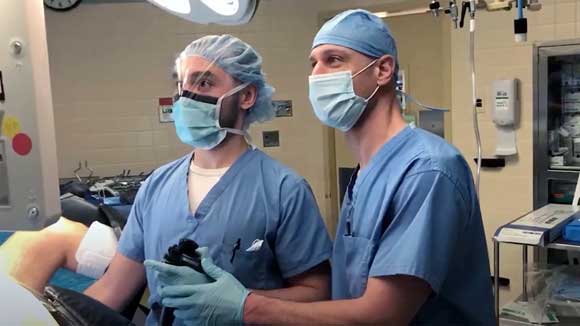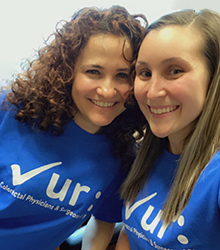Colon and Rectal Surgery Fellowship

Program Director: Richard Fortunato, DO, FACS, FASCRS
Fellows per year: 2
Quick links
About the program
The Allegheny Health Network (AHN) Colon and Rectal Surgery Fellowship offers a premier training experience designed to cultivate future leaders in the field. Accepting two fellows annually, the program provides unparalleled exposure to a high volume of complex cases, breadth of pathology and research opportunities, that encompasses the full spectrum of colon and rectal diseases.
The fellowship is located at Allegheny General Hospital (AGH), in Pittsburgh, Pennsylvania – a 700 bed, quaternary-level care hospital with 7 general surgery residents per year. AHN's colorectal division represents the largest presence in western Pennsylvania, drawing patients from a tri-state geographic area. This translates to a high volume of cases and exposure to a diverse range of complex pathologies.
AHN's Colon and Rectal Cancer Center of Excellence, the first in the state, provides access to advanced treatments, clinical trials, and individualized care plans. The fellows are intricately involved with organizing, planning and participating in our weekly multidisciplinary tumor board.
The AHN Colon and Rectal Surgery Fellowship is committed to
developing surgeons to gain exceptional technical skills and comprehensive
knowledge.
Surgical Excellence: Fellows at AHN will hone their skills in the most advanced surgical techniques, including:
- Robotic and Laparoscopic Surgery: Routine utilization of minimally invasive approaches for both benign and malignant diseases, ensuring proficiency in these increasingly vital techniques.
- Complex Anorectal Surgery: Fellows gain comprehensive experience in state-of-the-art treatment for fecal incontinence, complex rectovaginal fistulas, pilonidal disease and proctology - including sacral nerve stimulators, high-resolution anoscopy, and Transanal Minimally Invasive Surgery (TAMIS).
- IBD and Pouch Surgery: Extensive exposure to complex Inflammatory Bowel Disease (IBD) surgical management, including ileal pouch construction, equipping fellows to manage these challenging cases.
- Pelvic Floor Management: AHN offers comprehensive pelvic floor assessment services, and fellows benefit from a diverse array of in-office diagnostic procedures, including flexible sigmoidoscopy, rectal ultrasound, anal ultrasound, and anal manometry.
- Endoscopy: High volume screening and advanced colonoscopies
and flexible sigmoidoscopy, including colonic stenting, dilation and endoscopic mucosal resection. - Ureteral Stent Placement: Fellows are trained to perform cystoscopy and ureteral stent placement.
- Cadaver Labs: Our departmental colorectal cadaver labs provide enormous opportunity to improve both open and MIS surgical skills and practice rarely performed procedures, such as lateral lymph node dissection and colonic transposition.
- Advanced Pelvic Surgery: Fellows gain extensive exposure to complex pelvic procedures, including exenterations, re-operative surgery, rectourethral and anorectal vaginal fistulae, retrorectal tumors and other multivisceral procedures.
Commitment to Education: The fellows have protected time for academics, critical thinking, and evidence-based decision-making. This includes weekly presentations, discussions, and tumor boards. Additional forums throughout the month include morbidity and mortality conference, journal club and multidisciplinary IBD conference - further allowing the fellows to gain valuable insights into the comprehensive management of complex cases.
Research: Fellows are expected to participate in ongoing projects
and prepare research suitable for presentation at the American Society of Colon
and Rectal Surgeons (ASCRS).
The AHN Colon and Rectal Surgery Fellowship at AGH provides a
transformative training experience for aspiring colorectal surgeons, equipping
them with the skills, knowledge, and experience necessary to excel in this
challenging and rewarding field. Graduates of the program will be well-prepared
to become leaders in academic surgery, clinical practice, and research.
Application information
Applications for the Colon and Rectal Surgery Fellowship are taken through Electronic Residency Application Service® (ERAS®).
For more information, please call the medical education administrator at 814-452-5106.
Benefits and stipend
- Salary: $79,994
- Health and dental insurance: Interns, residents and associates pay a portion of the premium costs
- Life insurance, long-term disability and malpractice insurance
- Education: $1250 stipend to attend the annual American Society of Colon and Rectal Surgeons meeting
- Meal stipend
- 24-hour parking available in parking garage, associates pay a portion
- Paid time off: 10 working days per year for vacation or travel for interviews for prospective employment
An additional 10 days of salaried absence for off-site medical education (courses, symposia, etc.). No fewer than three of these days will be reserved for attendance at the annual meeting of the American Society of Colon and Rectal Surgeons.
About Graduate Medical Education
The Colon and Rectal Surgery Fellowship program is part of the Graduate Medical Education (GME) opportunities offered by the AHN Medical Education Consortium. Learn more about Graduate Medical Education.
Testimonials

"The split structure of the program exposes fellows to both community based and tertiary care in a way that complements any background in general surgery training. It's a unique experience where every attending you work with is invested in your learning and professional rather than putting up with you for a month while you scrounge for complex cases or pick up colonoscopies. Both sites are also receptive to fellow input for improvement, so you get to shape and improve the
program as you see fit rather than be a bystander."
Bethany Malone, M.D.
2020
"This fellowship gives you exposure to a diverse colorectal patient population with 6 months in a rural community improving upon fundamentals Of colorectal practice, endoscopy skills and working side by side with your teaching faculty. Another 6 months is spent complimenting your education in an urban setting in a busy tertiary referral center with complex pathology, resident teaching service and weekly conferences."
Anna Spivak, D.O.
2020
Contact us
Colon and Rectal Surgery Fellowship
Maggie Helsop, Medical Education Administator
814-452-5106
maggie.helsop@ahn.org
By accessing this video, I understand that I am leaving the AHN website and I will be re-directed to an external website operated by a third party platform provider. I acknowledge that the platform provider may collect personal information about me, and about the video that I view, on their platform and may use and disclose this information in accordance with its privacy policy. I agree that Allegheny Health Network is not responsible for the data collection and use practices of this third party.

